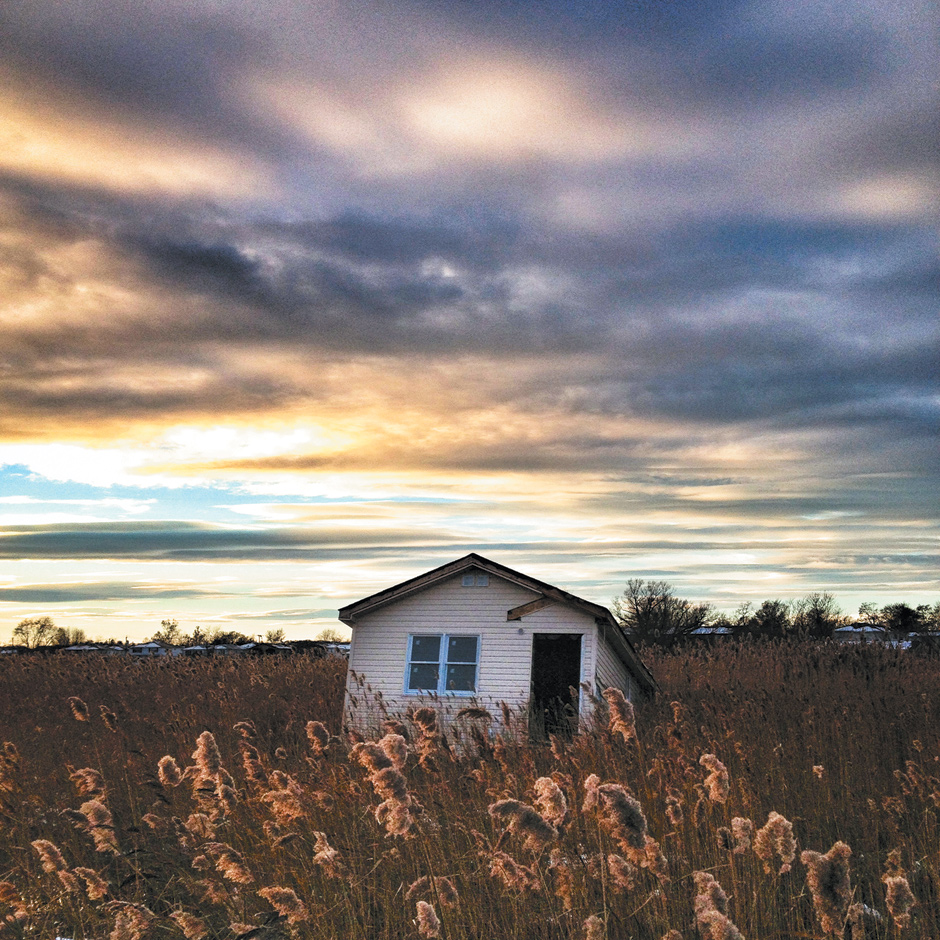
Wyatt Gallery
Wyatt Gallery: Displaced Home in Marsh, Midland Beach, Staten Island, November 2012; from the book #Sandy: Seen Through the iPhones of Acclaimed Photographers, to be published by Daylight in September. Gallery’s photograph also appears in the exhibition ‘Rising Waters,’ on view at the Museum of the City of New York until April 6, 2014. For more on the exhibition, see Michael Greenberg’s review.
There is the scientific and ideological language for what is happening to the weather, but there are hardly any intimate words. Is that surprising? People in mourning tend to use euphemism; likewise the guilty and ashamed. The most melancholy of all the euphemisms: “The new normal.” “It’s the new normal,” I think, as a beloved pear tree, half-drowned, loses its grip on the earth and falls over. The train line to Cornwall washes away—the new normal. We can’t even say the word “abnormal” to each other out loud: it reminds us of what came before. Better to forget what once was normal, the way season followed season, with a temperate charm only the poets appreciated.
What “used to be” is painful to remember. Forcing the spike of an unlit firework into the cold, dry ground. Admiring the frost on the holly berries, en route to school. Taking a long, restorative walk on Boxing Day in the winter glare. Whole football pitches crunching underfoot. A bit of sun on Pancake Day; a little more for the Grand National. Chilly April showers, Wimbledon warmth. July weddings that could trust in fine weather. The distinct possibility of a Glastonbury sunburn. At least, we say to each other, at least August is still reliably ablaze—in Cornwall if not at carnival. And it’s nice that the Scots can take a little more heat with them when they pack up and leave.
Maybe we will get used to this new England, and—like the very young and recently migrated—take it for granted that April is the time for shorts and sandals, or that the New Year traditionally announces itself with a biblical flood. They say there will be butterflies appearing in new areas, and birds visiting earlier and leaving later—perhaps that will be interesting, and new, and not, necessarily, worse. Maybe we are misremembering the past! The Thames hasn’t frozen over for generations, and the dream of a White Christmas is only a collective Dickensian delusion. Besides, wasn’t it always a wet country?
It’s amazing the side roads you can will yourself down to avoid the four-lane motorway ahead. England was never as wet as either its famous novels suggest or our American cousins presume. The weather has changed, is changing, and with it so many seemingly small things—quite apart from train tracks and houses, livelihoods and actual lives—are being lost. It was easy to assume, for example, that we would always be able to easily find a hedgehog in some corner of a London garden, pick it up in cupped hands, and unfurl it for our children—or go on a picnic and watch fat bumblebees crawling over the mouth of an open jam jar. Every country has its own version of this local sadness. (And every country has its version of our arguments, when it comes to causation. Climate change or cars? Climate change or cell phone sites?) You’re not meant to mention the minor losses, they don’t seem worth mentioning—not when compared to the visions of apocalypse conjured by climate scientists and movie directors. And then there are all those people who believe that nothing much is happening at all.
Although many harsh words are said about the childlike response of the public to the coming emergency, the response doesn’t seem to me very surprising, either. It’s hard to keep apocalypse consistently in mind, especially if you want to get out of bed in the morning. What’s missing from the account is how much of our reaction is emotional. If it weren’t, the whole landscape of debate would be different. We can easily imagine, for example, a world in which the deniers were not deniers at all, but simple ruthless pragmatists, the kind of people who say: “I understand very well what’s coming, but I am not concerned with my grandchildren; I am concerned with myself, my shareholders, and the Chinese competition.” And there are indeed a few who say this, but not as many as it might be reasonable to expect.
Another response that would seem natural aligns a deep religious feeling with environmental concern, for those who consider the land a beauteous gift of the Lord should, surely, rationally, be among the most keen to protect it. There are a few of these knocking around, too, but again, not half as many as I would have assumed. Instead the evidence is to be “believed” or “denied” as if the scientific papers are so many Lutheran creeds pinned to a door. In America, a curious loophole has even been discovered in God’s creation, concerning hierarchy. It’s argued that because He placed humans above “things”—above animals and plants and the ocean—we can, with a clean conscience, let all those things go to hell. (In England, traditional Christian love of the land has been more easily converted into environmental consciousness, notably among the country aristocrats who own so much of it.)
Advertisement
But I don’t think we have made matters of science into questions of belief out of sheer stupidity. Belief usually has an emotional component; it’s desire, disguised. Of course, on the part of our leaders much of the politicization is cynical bad faith, and economically motivated, but down here on the ground, the desire for innocence is what’s driving us. For both “sides” are full of guilt, full of self-disgust—what Martin Amis once called “species shame”—and we project it outward. This is what fuels the petty fury of our debates, even in the midst of crisis.
During Superstorm Sandy, I climbed down fifteen floors, several months pregnant, in the darkness, just so I could get a Wi-Fi signal and e-mail a climate-change-denying acquaintance with this fresh evidence of his idiocy. And it only takes a polar vortex—a pocket of cold air that may lower temperatures—for one’s inbox to fill up with gleeful counternarratives from right-leaning relatives—as if this were all a game, and the only thing hanging in the balance is whether or not you or your crazy uncle in Florida are “alarmists” or “realists.” Meanwhile, in Jamaica, where Sandy first made landfall, the ever more frequent tropical depressions, storms, hurricanes, droughts, and landslides do not fall, for Jamaicans, in the category of ontological argument.
Sing an elegy for the washed away! For the cycles of life, for the saltwater marshes, the houses, the humans—whole islands of humans. Going, going, gone! But not quite yet. The apocalypse is always usefully cast into the future—unless you happen to live in Mauritius, or Jamaica, or the many other perilous spots. According to recent reports, “if emissions of global greenhouse gases remain unchanged,” things could begin to get truly serious around 2050, just in time for the seventh birthday party of my granddaughter. (The grandchildren of the future are frequently evoked in elegies of this kind.) Sometimes the global, repetitive nature of this elegy is so exhaustively sad—and so divorced from any attempts at meaningful action—that you can’t fail to detect in the elegists a fatalist liberal consciousness that has, when you get right down to it, as much of a perverse desire for the apocalypse as the evangelicals we supposedly scorn.
Recently it’s been possible to see both sides leaning in a little closer to hear the optimistic arguments of the technocrats. Some sleight of hand has occurred by which we begin to move from talk of combating and reversing to discussion of carbon capture and storage, and higher sea walls, and generators on the roof, and battening down the hatches. Both sides meet in failure. They say to each other: “Yes, perhaps we should have had the argument differently, some time ago, but now it is too late, now we must work with what we have.”
This will no doubt look very peculiar to my seven-year-old granddaughter. I don’t expect she will forgive me, but it might be useful for her to get a glimpse into the mindset, if only for the purposes of comprehension. What shall I tell her? Her teachers will already have explained that what was happening to the weather, in 2014, was an inconvenient truth, financially, politically—but that’s perfectly obvious, even now. A global movement of the people might have forced it onto the political agenda, no matter the cost. What she will want to know is why this movement took so long to materialize. So I might say to her, look: the thing you have to appreciate is that we’d just been through a century of relativism and deconstruction, in which we were informed that most of our fondest-held principles were either uncertain or simple wishful thinking, and in many areas of our lives we had already been asked to accept that nothing is essential and everything changes—and this had taken the fight out of us somewhat.
And then also it’s important to remember that the necessary conditions of our lives—those things that seem to us unavoidably to be the case—are not only debated by physicists and philosophers but exist, irrationally, in the minds of the rest of us, beneath contempt intellectually, perhaps, but we still experience them as permanent facts. The climate was one of those facts. We did not think it could change. That is, we always knew we could do a great deal of damage to this planet, but even the most hubristic among us had not imagined we would ever be able to fundamentally change its rhythms and character, just as a child who has screamed all day at her father still does not expect to see him lie down on the kitchen floor and weep. Now, do you think that’ll get me off the hook with my (slightly tiresome and judgmental) future granddaughter? I worry.
Advertisement
Oh, what have we done! It’s a biblical question, and we do not seem able to pull ourselves out of its familiar—essentially religious—cycle of shame, denial, and self-flagellation. This is why (I shall tell my granddaughter) the apocalyptic scenarios did not help—the terrible truth is that we had a profound, historical attraction to apocalypse. In the end, the only thing that could create the necessary traction in our minds was the intimate loss of the things we loved. Like when the seasons changed in our beloved little island, or when the lights went out on the fifteenth floor, or the day I went into an Italian garden in early July, with its owner, a woman in her eighties, and upon seeing the scorched yellow earth and withered roses, and hearing what only the really old people will confess—in all my years I’ve never seen anything like it—I found my mind finally beginning to turn from the elegiac what have we done to the practical what can we do?
This Issue
April 3, 2014
He Remade Our World
Putin: During and After Sochi



